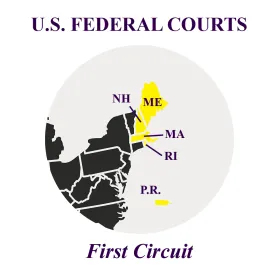Addressing for the first time whether federal res judicata law recognizes the alternative determinations doctrine, the US Court of Appeals for the First Circuit determined that a plaintiff’s claims under the Visual Artists Rights Act (VARA) were not precluded by a previous action in which she brought a federal copyright claim against the defendant. Foss v. Eastern States Exposition, Case No. 22-1313 (1st Cir. May 10, 2023) (Barron, Howard, Montecalvo, JJ.)
Cynthia Foss previously brought a federal copyright action against Eastern States Exposition that was dismissed. The previous action did not involve any claim under VARA. Eastern argued that claim preclusion should apply to bar the claim, and the district court agreed. Foss appealed.
To establish federal claim preclusion, a party must establish that there is a final judgment on the merits in an earlier suit, sufficient similarity between the causes of action asserted in the earlier and later suits, and sufficient identicality between the parties in the two suits. Foss did not dispute that the first and third requirements were satisfied, and thus the First Circuit’s decision turned on whether the second requirement was met.
Foss argued that the “alternative determinations” doctrine should apply. This doctrine strips a dismissal of claim preclusive effect if the dismissal rests on multiple grounds, not all of which would on their own render the dismissal claim preclusive. Whether the doctrine should apply was a matter of first impression in the First Circuit. Foss argued that the previous dismissal was in part based on “her failure to allege that she had satisfied the registration-related precondition to copyright infringement suits under § 411(a),” which was not a merits-based dismissal and therefore had no preclusive effect. Eastern argued that even if the First Circuit adopted the alternative determinations doctrine, the Court should limit the doctrine because the district court “rigorously considered” the merits-based rationale for dismissal in the previous action.
The First Circuit adopted the alternative determinations doctrine and rejected Eastern’s contention that the doctrine should not apply in the instant case because Eastern did not provide support for the contention that the district court in the previous action “rigorously considered” the merits-based grounds for dismissal of Foss’s federal copyright claims. The Court then remanded the case for further consideration, noting that Eastern might argue that the alternative disputes doctrine should be limited in this instance because of Foss’s failure to allege satisfaction of the precondition to suit, which might be prejudicial to Eastern.




 />i
/>i

